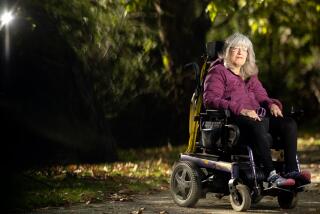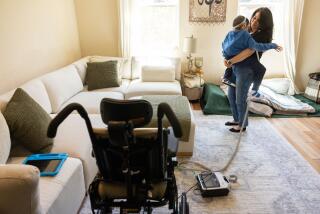Kaiser Transplant Patients Express Their Fear and Fury
- Share via
“I don’t know what’s going on here,” Bernard Burks wrote to Kaiser Permanente’s kidney transplant program last October, “but whatever it is, it’s wrong.”
Burks, 56, was among hundreds of patients forced to shift to Kaiser’s new San Francisco program about a year earlier, when Kaiser stopped paying for their transplant care at outside hospitals. He feared that his chances of getting a kidney were slipping away.
His daughter was willing to give him one of her kidneys -- a good match -- to rescue him from grueling rounds of dialysis. But no one at Kaiser seemed to care.
Months passed and he grew increasingly agitated. The transplant coordinator handling the case “is worth about two dead flies,” he wrote in March to the program’s medical director.
Kaiser staff hadn’t read their own files, he continued: “You stated in your letter, ‘If you have a family member or friend who might want to discuss donation of a kidney for you, please have them call us.’ Check your damn records. It appears you are a bunch of incompetents who fail to communicate with each other.”
News about the flawed start-up of Kaiser Permanente’s Northern California transplant program this week has unleashed bitter recollections and powerful emotions among patients who say that for months they have had their appointments inexplicably canceled, records lost and pleas met with eerie indifference.
Now they are more than frustrated -- they’re fearful. And some want out.
“I don’t want those guys cutting on me now,” said Burks, a real estate appraiser in the Sacramento area. “I’m afraid.... I just don’t trust them.”
After The Times contacted Kaiser about Burks’ case, the HMO set up a meeting with him for Tuesday to discuss moving his surgery to a different hospital, he said.
In mid-2004, Kaiser notified about 1,500 Northern California patients that they would have to move to Kaiser’s fledgling transplant program from the well-established transplant programs at UC San Francisco and UC Davis, which had been caring for them under contract with the nation’s largest HMO.
The transition has been fraught with problems, a Times investigation found. Since Kaiser took over, the number of transplants has plummeted, leaving patients on prolonged dialysis treatments, which can cause deadly complications and harm chances for a successful transplant later.
In the meantime, paperwork snafus meant that hundreds of patients’ transfers were not processed. Some lost their place in line for months or were rendered “inactive” -- effectively ineligible for a kidney.
The patients, however, were never told of the problems.
Kaiser officials declined to comment Friday on specific patient cases but said they have begun an internal inquiry and plan to contact the more than 2,000 patients now on Kaiser’s waiting list to invite their questions and concerns. They are also considering whether to allow the patients to go back to non-Kaiser transplant programs for their care, the officials said.
“We’re taking this all very seriously,” said Mary Ann Thode, president of the Northern California region of Kaiser Foundation Health Plan and Hospitals. “We absolutely want to have the best-quality program that we can possibly have.”
Outside regulators have begun inquiries into Kaiser’s conduct as well.
The United Network for Organ Sharing, the federally funded contractor that oversees the transplant system nationwide, started looking into the Kaiser program this week after The Times’ articles ran, executive director Walter Graham said.
Separately, the state Department of Managed Health Care is investigating the reported problems at Kaiser’s Northern California health plan. Spokeswoman Lynne Randolph said the agency is willing to intervene on behalf of individual Kaiser members. (Southern California Kaiser patients are not affected by the Bay Area program.)
Most patients in the Kaiser program were in line for cadaver kidneys from strangers -- a wait that typically takes up to six years. But some of the angriest patients today are those fortunate enough to have offers of live donations from relatives. If the organ is well-matched to the recipient, those patients usually get their transplants right away.
It hasn’t worked that way for Jason Mitchell.
Mitchell, 32, had begun a promising career in politics. After going into renal failure in early 2004, he was forced to leave his job as a legislative director in the California Assembly and later begin thrice-weekly rounds of dialysis.
In November of that year, he said, he notified Kaiser that his father, Evert, was willing to donate a kidney. Blood tests showed that the organ was a match.
But where Mitchell saw a way back to his old life, Kaiser saw only problems, he said. First, doctors told his father he had to lose weight. Then they said his blood pressure needed to be lower.
His father did everything he was told, Mitchell said.
Then just this week, Mitchell visited his Kaiser nephrologist in Sacramento. The kidney specialist told him that his father, 57, couldn’t donate because the older man was taking blood pressure medications -- an objection that Mitchell said had never been raised before.
“If it turns out that he can’t be a donor, it’s a year wasted,” Mitchell said. “I’m stuck on dialysis, unable to go to work. I’m on disability. My life has been on hold.”
He said that his younger brother and an uncle are willing to be donors but that Kaiser has refused to test more than one person at a time.
After his experiences and news of the program’s upheaval, he said: “I’m to the point now where I want to find out what my options are. I have no confidence in their transplant people. I don’t want them touching me.”
Burks’ daughter, Leatha Sims, said she didn’t mind the repetitive tests and screenings she had to undergo to be his living donor.
“Now,” she said, “it looks like they were stalling.”
Sims, 34, said she began questioning what was going on at Kaiser after she learned that transplant staffers were trying to convince her father that she didn’t really want to donate a kidney to him, citing her move to Texas.
“My dad didn’t even want my kidney, and that made me want to give it to him even more,” she said. “They’re trying to make him think I don’t want to do this.”
Like her father, Sims no longer wants the transplant performed at Kaiser. When a Kaiser representative called this week, she said, she told her: “I’m not doing it with you guys. We’ll mortgage the house, and we’ll just get it done elsewhere.”
Celia Scull hasn’t been fortunate enough to find a living donor. She’s in the long line for a cadaver kidney.
What angers Scull, 60, is Kaiser’s apparent indifference to the impact of dialysis on those awaiting kidneys. She took particular issue with the statement of a Kaiser physician executive this week that the program’s chaotic start had not hurt patients.
“It isn’t as if waiting another six months or nine months for a transplant is a death sentence,” Dr. Sharon Levine had told The Times.
“If I could get my hands on her, I’d vivisect her,” said Scull, who undergoes three-hour dialysis sessions three days a week.
Scull, a loyal Kaiser member for more than 25 years, is leery of entrusting her life to a program in such disarray.
“Did you read your stories?” she asked a reporter. “Would you let [them] touch you?”
Scull’s husband called Kaiser this week to check on his wife’s case. On Friday, a Kaiser transplant official called Celia Scull to reassure her, urging her to “calm down,” she said.
Judi Franich had never been comfortable with the idea of letting the new Kaiser center handle her transplant. Now she feels vindicated -- though it gets her nowhere.
She had her first kidney transplanted at UC San Francisco in 1995. When that one failed in 2004, she signed on at the university medical center to wait for another cadaver kidney.
Later that year, when Kaiser said she needed to transfer to its new program, Franich refused. She’d grown close to her doctors at UC San Francisco.
Kaiser officials told her that she could stay wherever she wanted but that they wouldn’t pay. She is still officially on the waiting list at UC San Francisco, while she considers her options.
A little more than a month ago, Kaiser transplant surgeon Hootan Roozrokh sent Franich a letter saying she could file a grievance if she wanted to.
“I am assuming you will change carriers based on our conversation, so I will close your chart in the transplant offices,” he wrote.
His letter concluded: “Good luck at getting a kidney!”
*
Tracy Weber may be contacted at [email protected] and Charles Ornstein at [email protected].
More to Read
Sign up for Essential California
The most important California stories and recommendations in your inbox every morning.
You may occasionally receive promotional content from the Los Angeles Times.










